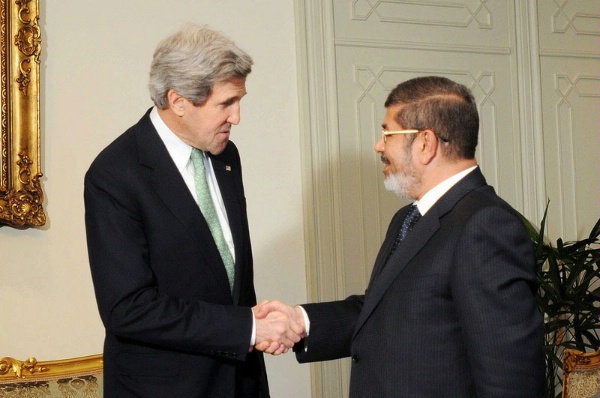After meeting with Egyptian President Mohamed Morsi on Sunday, Secretary of State John Kerry promised to immediately send Egypt an additional $250 million in aid, as the US tries desperately to maintain influence in the key Middle East state.
 In their closed-door, one on one meeting, Kerry initially called on Morsi to implement economic reforms in order to be eligible for nearly $5 billion from the International Monetary Fund (IMF). But the subject soon turned to unlocking the $450 million in US aid that Congress delayed over concerns about the Islamist leadership in Egypt.
In their closed-door, one on one meeting, Kerry initially called on Morsi to implement economic reforms in order to be eligible for nearly $5 billion from the International Monetary Fund (IMF). But the subject soon turned to unlocking the $450 million in US aid that Congress delayed over concerns about the Islamist leadership in Egypt.
Of the $250 million Kerry pledged, $190 million comes from the $450 million Congress froze. The remainder could be unfrozen and sent to Egypt’s government, Kerry said, if political reforms come through. This is on top of the $2 billion the Washington still provides Egypt.
“When Egypt takes the difficult steps to strengthen its economy and build political unity and justice, we will work with our Congress at home on additional support,” Kerry said. “These steps will also unlock much needed private-sector investment and broader financial assistance.”
Kerry spoke of the need to help Egypt through troubling times, and at least rhetorically made more aid contingent on progressive reforms. But US aid to Egypt serves the interests of power in Washington.
“[T]he U.S. strategy in the region is to prefer a managed transition to civilian rule and democratic governance as long as the American major strategic objectives are not challenged,” wrote Esam Al-Amin last year. Namely, to “keep the Americans in, the Chinese and Russians out, the Iranians down, and the Israelis safe.”
And as The New York Times reported last year, US aid to Egypt helps keep the pockets of defense corporations nice and full.
The US propped up the brutal regime of Hosni Mubarak for decades. With an Egypt still in an uneasy transition, Washington is happy to continue to bribe undemocratic regimes in return for geo-political influence.


